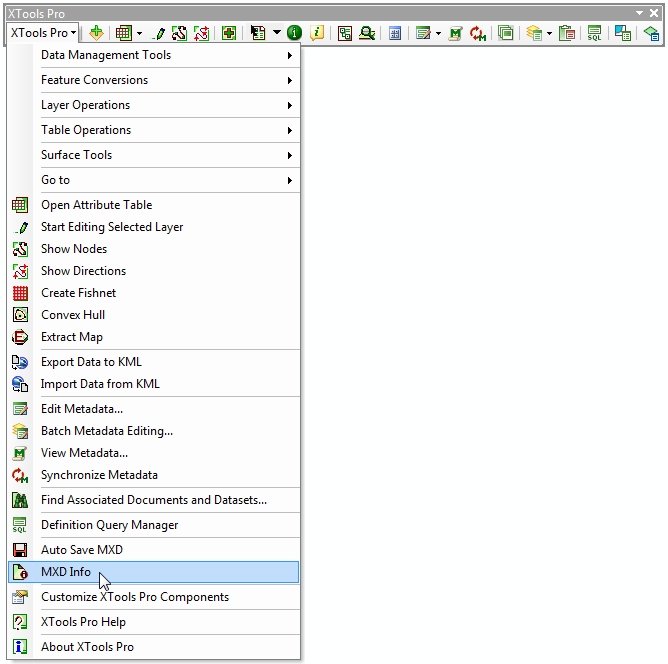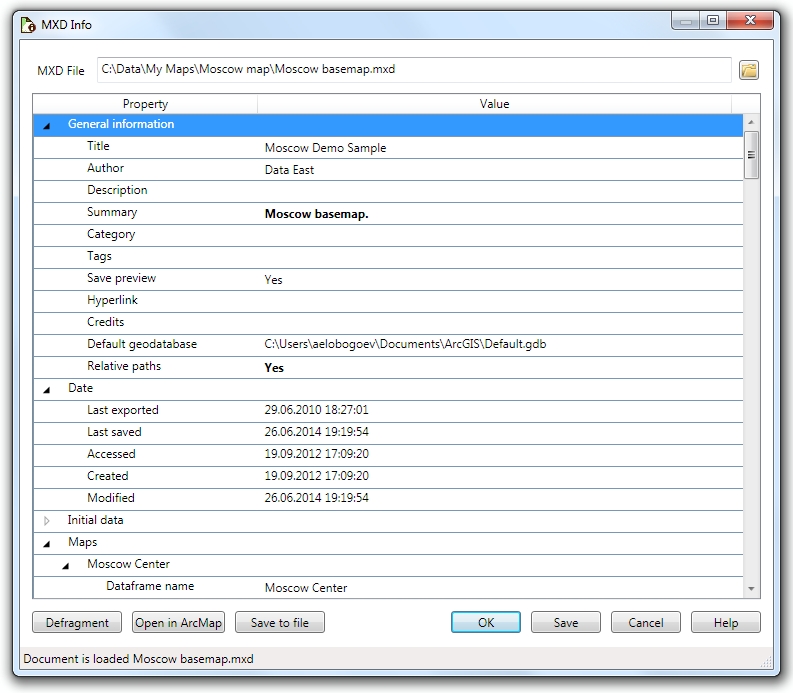MXD Info
Purpose
The MXD Info tool is provided for viewing and editing information about MXD documents without actually opening them in ArcMap. At that, there is an option for defragmenting MXD documents.
Description
Working with spatial data and maps sometimes you may need to see and maybe change the details about a map in a convenient way, in one window. Something like what you see in ArcMap Document Properties but in even more details. At that, you may wish to see this information about MXD document without opening it - it may happen it is a wrong MXD document and you don't need to open it. Besides, some MXDs may take really long to open.
And sometimes you may need to defragment your MXD as with time they tend to become a real mess internally. You don't see it directly, but you can experience it - you can feel how longer it takes to open, and you can see how larger the MXD file is getting with time.
Retrieving information about MXD documents
The MXD Info tool is always available from the XTools Pro toolbar drop down menu or from the XTools Pro Navigator as soon as you activate XTools Pro extension. It can also be placed as a button on the XTools Pro toolbar for easier access.

When you run the tool for the open map in ArcMap the following window appears:

Here you see the information about the MXD document being currently open in ArcMap. If you just loaded data to ArcMap and did not save it as MXD it still shows the information the layers and some general information.
Besides, you can also select any other MXD document from the disk. This way you can retrieve the information about an MXD document without actually opening it.
Following information about MXD documents is provided by the MXD Info tool:
-
General information
- includes details that you can get from the Map Document Properties in ArcMap:
- Author (editable)
- Category (editable)
- Description (editable)
- Credits (editable)
- Hyperlinks (editable)
- Tags (editable)
- Save preview (editable)
- Summary (editable)
- Title (editable)
- Relative paths (editable)
- Default geodatabase
Note: editing General information for map documents is only available for ArcGIS 10.x users.
-
Date
- shows dates when the MXD document was created, modified, accessed, last saved, last printed and last exported
-
Initial data
- provides ArcGIS version and template/styles used in the MXD document
-
Maps
- lists data frames contained in the MXD document and their properties:
- Map (data frame) name (editable)
- Map description (editable)
- Credits (editable)
- Display units (editable)
- Map units (editable)
- Reference scale (editable)
- Rotation (editable)
- Extent
- Spatial reference
-
Map layers
- lists map layers and its' properties:
- Layer name (editable)
- Dataset name
- Path
- Description (editable)
- Min scale (editable)
- Max scale (editable)
- Geometry type
- Spatial reference
- Visible (editable)
- Feature count
- Field count
- Definition query (editable)
- Labels (editable)
- Z values
- M values
- Times
- Relates
- Joins
- Transformation
-
Layers that may cause rasterization
- lists map layers that may cause rasterization when printing or exporting map, indicating the reasons for rasterization:
- Layer transparency
- Raster-based picture symbols
- Field-based transparency
All these MXD Info details can be saved to file, Text and HTML formats supported.
For the map documents currently open n ArcMap you can apply edits and changes and then save them with map document itself. For the map document loaded from disk you can save edits and changes directly in the MXD Info dialog window.
Defragmenting MXD documents
The MXD Info tool allows defragmenting the storage in ArcMap MXD documents in order to reduce the file size. This can be especially useful if you see that your MXD files become too large.
To defragment the MXD document just open it in the MXD Info window and press the Defragment button. A new MXD file with the _defrag.mxd name will be created in the same folder as the original MXD. This way a new file is always created after defragmentation procedure and the original MXD is not affected.
Note: defragmenting functionality can be also applied to .mxt template files.
---






